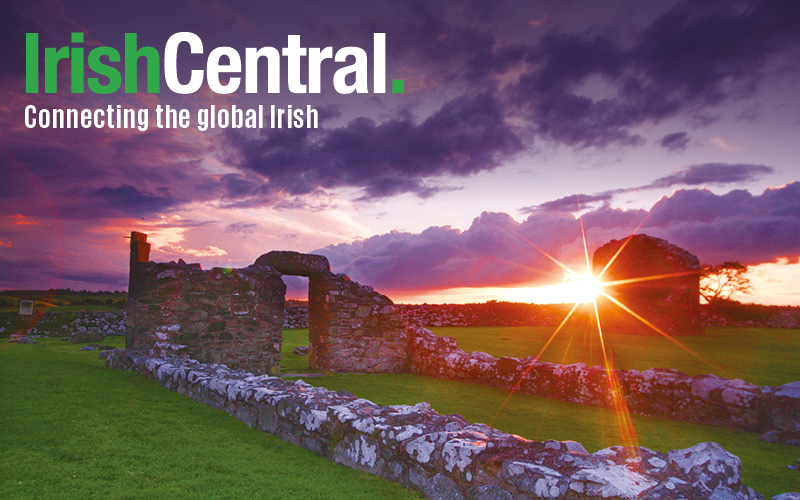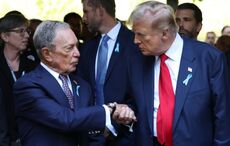He has the look of an athlete, compact with broad shoulders. He also has something of a pre-game focus, a quiet intensity, and gives the impression, even as he answers questions, that he has his eye on the ball and he’s not forgetting for a moment that right now he’s involved in the biggest game of his career.
At just 49, Brian Moynihan is engaged in the complicated task of integrating Merrill Lynch into Bank of America.
A graduate of Brown University and the University of Notre Dame Law School, Moynihan joined FleetBoston in April 1993 as deputy general counsel, and came to Bank of America following its acquisition of FleetBoston.
He arrived at his present position as the head of Bank of America’s Global Banking and Wealth Management in January, after Bank of America’s $50 billion acquisition of Merrill Lynch and the departure of Merrill’s CEO John Thain.
“He has proved in difficult environments he is very capable,” said Anthony DiNovi, co-president of Boston private-equity firm Thomas H. Lee Partners LP, in a Wall Street Journal article by Dan Fitzpatrick and Suzanne Craig. The article addressed Moynihan’s emergence as a right-hand man and potential successor to Bank of America Corp. Chief Executive Kenneth Lewis.
DiNovi, who has worked with Moynihan on past deals, also said, “When Ken has a tough job at hand he turns to Brian, and Brian has always been there for him.”
Moynihan, who grew up in a small town in Ohio, lives in Wellesley, Massachusetts with his wife, Susan Berry, whom he met while he was at Brown, and their three children. He credits Susan’s family, along with playing rugby (which has taken him to Ireland on occasion), with bringing him up to speed on Irish culture.
“My wife’s grandmother is from Ireland so she’s more the classic sort of Boston Irish – the Clancy brothers, the Irish humor and all that stuff,” he says, adding that he’s been at many St. Patrick’s Day Parades in Southie. His own family immigrated in the 1850s to upstate New York and grew vegetables.
Our meeting took place on the afternoon of June 15, at the newly constructed Bank of America Tower at Avenue on the Americas in Midtown Manhattan. The massive steel and glass structure – a one billion dollar project – located on Avenue of the Americas – would seem to signal Bank of America’s confidence that it will weather this current financial crisis.
As I receive my visitor’s pass from Security and find my way into the inner sanctum of the largest bank in the United States, passing through a futuristic set of glass doors, I cannot help but think of Moynihan’s ancestors being processed by immigration officials after landing in New York. They could hardly have foreseen a future that included anything like this. But it is a tribute to those hardscrabble ancestors, and perhaps because he had inherited some of their tenacity and understanding “that it doesn’t all break your way all the time, so you’ve got to just power through it,” that Moynihan took time out from his hectic schedule to talk to Irish America, and agreed to give the Keynote Address at our annual Wall Street 50 dinner on August 24.
Your family came over when?
In the 1850’s. Both my parents come from small towns in upstate New York where the Irish part of their families had farms and then opened some stores. My grandfather was a lawyer up there. My dad went to school and became a chemist to work for DuPont. I’m one of eight children, number six. My parents moved to a little town in Ohio, called Marietta, the month before I was born.
After doing your undergrad at Brown you went to Notre Dame Law School. Was that a different experience?
Very different. Brown was a great school but it was very heavily Eastern. My grandfather and my uncle both went to Notre Dame, so I had a great Notre Dame tradition. It was the best place in the world to go to law school. It was a very supportive place and we had more fun than we probably should have had. It’s a great school for a lot of reasons, but the law school was small, you really knew the professors, you really knew the undergraduates. I played rugby so it was fun, too.
Do you think Rev. John Jenkins, Notre Dame’s president, was right to invite President Obama to give the commencement speech?
I think he was right, his reasoning was right. I think at the end of the day one of the challenges for a place like Notre Dame is to ensure that they maintain their willingness to have the debate. I think going back to Father Hesburgh [“Father Ted,” the man who led the University of Notre Dame for 35 years], the reason why the university has had such an impact on political leaders and others in this country, is that they’re willing to have debates even though they have a heritage and a particular point of view. It served them well.
When were you last in Ireland?
We went last August [2008]. We took my father and mother, and three of my siblings and our children went, so we had about 18 people traveling around in a bus, and it was a lot of fun. We went to Dublin for a few days and then took off down to the southwest. We had a bus driver who had that great Irish humor; we just laughed.
Did you discuss the economy?
He [the bus driver] and other Irish people we met along the way had the common view that it was United States property values and subprime mortgages and all that that created this worldwide financial crisis which was starting to affect Ireland. But at the end of the day, it is local conditions that drive housing prices. Irish housing prices had gotten so out of control relative to what a person could pay that you knew they were going to face what they faced. It’s a classic problem that if you try to outgrow your normal growth rate there’s always a bubble on the other side of it. And as soon as the economy slowed down a little it just all came crashing down. It’ll adjust and come back.
Will the U.S. economy also adjust?
Our view, as a company, is that we’ll start to see a little growth in the latter part of this year and into next year, but the American consumer is still struggling to pay their debts. American companies are more – they’re stabilizing, I think would be the word we’d say right now, in terms of their employment, in terms of their view of their future. They’re not robust and growing but they’re stabilizing, so they’ve come through the worst of it, and we see we’re starting to come out the other side. And I think that bodes well for the whole world because when the American consumer spends, that helps everyone.
The Irish government was the first to guarantee bank deposits. And after its bailout it now has 75 percent voting rights now in Anglo-Irish Bank. How does that compare to here?
I thought the Irish government did a good job of stabilizing the situation. What’s hard to appreciate here is how much more consolidated most [national] economies are compared to the U.S. – like Ireland in banking. When you have three or four key institutions that aren’t stable and people start pulling their money out, it’s really tough. So I think the government did the right thing to calm the population down by guaranteeing their deposits, guaranteeing the liability side, and injecting their capital. I assume their goal would be to sell their stock positions down over time as the economy stabilizes. But in the U.S. because of the number of institutions and the size of the capital markets, we were able to raise our capital, our company and other companies, through private investors, after the government gave us capital.
Are there lessons to learn from the crisis?
Ireland and America and UK and Europe and China and Japan, everybody’s going to learn a series of lessons from all this, but I think the common lesson is going to be about leverage, and too much borrowing. In Ireland for example, I saw houses that were valued at over $2 million, beautiful houses but miles from the city in the countryside, where population pressures were nonexistent. People bought outside their means, they could’ve taken cash out to do something else with it, just the same as the United States. A financial crisis was created by the same thing that creates most of them – too much borrowing, and then when the day of reckoning came, when people had to pay it back and they weren’t earning as much money, because the economy slowed down, everybody got in trouble.
Do you think the banks are at fault in any of that?
We’re all at fault. Everybody’s at fault, all the participants are at fault, from the banks to the regulatory environment to the corporations to the – we all sort of participated and when the liquidity bubble popped it was probably –
Devastating—
And I think we as an industry must do all we can to help educate people. We all, as consumers, have to be more responsible. It comes down to less complexity and less leverage. My children will probably be more conservative in how they save just because of the experience [of this crisis] that they’ve read about in the papers.
How global is Bank of America?
Three hundred thousand people work at Bank of America [worldwide]. We’ve got a big [credit] card business in Ireland; we’ve got investment bankers and corporate bankers in Ireland.
Ireland did a good job of figuring out the pickle they were in 30 years ago and said, "Let’s develop some capabilities, some industries." And they were able to do that. Now the question is, it’s a never ending reinvention, so whether it’s Ireland, the northeastern United States after the manufacturing moved years ago, Michigan after the auto industry changes – you just got to keep reinventing yourself. So I think the challenge for Ireland is, what’s next? The country has got a lot of great resources, a lot of great people, it’s a question of how do you keep reinventing yourself to stay ahead of the game, because these things always naturally have an ebb and flow to them.
How do we reinvent ourselves here?
In the United States? I think it’s around the types of things that made the country very strong. We have a great natural talent base around industries, financial services being one of them, but also technology, healthcare and different kinds of manufacturing businesses. The energy infrastructure is an area where we should be at the leading edge of the world. We’re still on the cutting edge in terms of technology, medicine and other scientific research in biology, chemistry, etc. We just have to keep investing in our educational systems and our capabilities to be inventive.
Many of America’s greatest inventors were immigrants like your family and mine. Right now America has closed the door on immigration. Where do you stand on that?
I think we have to make sure that we [as a country] tap into the talents from people all around the world – that’s what got us where we are today. We as a company believe in that. I’ve been involved at Brown University and other places where you see the amount of talent that comes from other places. There was a young woman who spoke to us who came from Belarus. Think of that talent around the world which can, and wants to, come here to learn and help our country grow and prosper. I think that’s consistent with how we got here.
Is there anything in your Irish makeup, any particular Irish characteristics that maybe helped you to get to where you’re at?
I think we Irish try to have a good sense of humor, and I think you’ve got to be serious but not take yourself too seriously. I think also that no matter how many generations removed, there’s a little bit of a chip on the shoulder, and that you always [feel you must] prove yourself. There’s no sense of entitlement, no sense of placement, it’s all a sense of you’ve got to go out and work hard to get there. It doesn’t all break your way all the time, so you’ve got to just power through it. I think that’s deeply embedded in the culture of the Irish, including the Irish that went around the world, not only to this country but other countries. There’s a common trait, the people all had a sense that they needed to keep pushing forward, and they were never sort of settled. And I think that if you look across generations and look across people and meet people in the current generation in Ireland you see that trait’s still there.




Comments